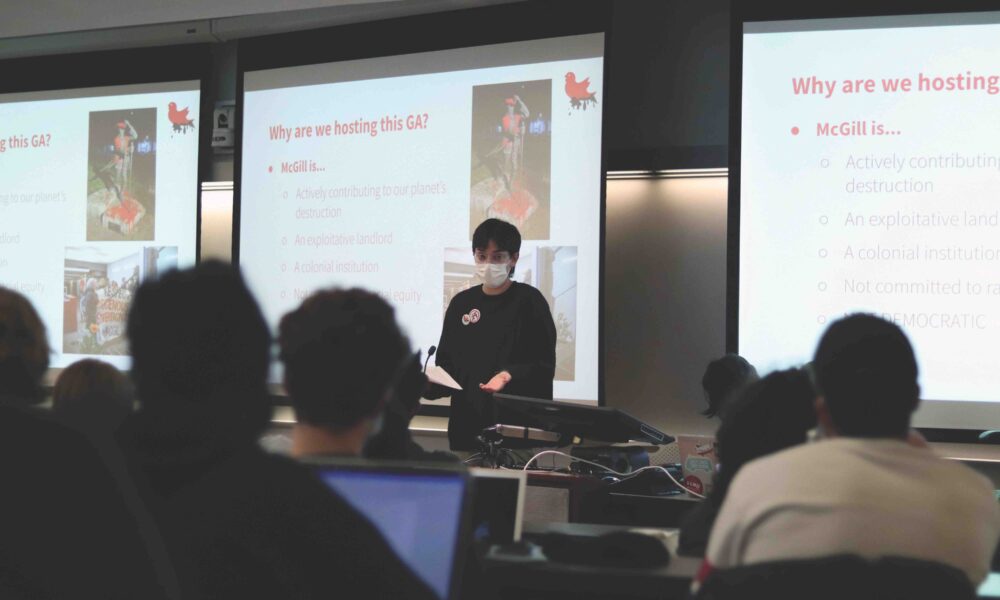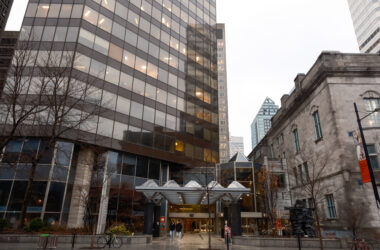Divest McGill and Divest For Human Rights McGill hosted Democratize McGill, a hybrid open assembly, on Nov. 19 to facilitate discussion about ways to democratize the university’s many governance structures. The approximately 100 students in attendance—both in-person at Leacock 132 and on Zoom—were encouraged to share their thoughts on McGill’s current governance structure and propose formal solutions, which the entire assembly then voted on.
In a binding vote that occurred at the end of the meeting, the assembly unanimously determined that Democratize McGill would become an independent coalition separate from Divest McGill. Votes on whether to pursue solutions were non-binding. Instead, they provided direction and objectives for the coalition to strive for.
Participants discussed how to increase student involvement and representation in McGill’s various decision-making bodies. While the event focussed on integrating democratic values and processes into current governance structures, attendees also introduced ideas about democratizing other areas such as academics and the university’s financial investments. Iryn McMechan, U1 Arts, described the energy and environment of the assembly.
“Being at this event, it was easy to detect tension in the voices of many McGill students,” McMechan said. “We are tired of not having our voices heard and experiencing a total lack of transparency when it comes to a lack of decisions.”
Many of the students present expressed discontent with McGill’s current governing structure. Participants cited the university’s ongoing investment in fossil fuels and their exclusion of Black, Indigenous, and Palestinian voices in their decision making as evidence of the disconnect between the McGill community’s values and the university’s actions.
Attendees proposed different—sometimes contrasting—solutions to address the many issues on the table. Propositions included electing—rather than appointing—the 17 members of the McGill Board of Governors, recording and releasing all meetings of the Board of Governors in a more accessible way, and transitioning McGill’s governance structure from one of a representative republic to one of direct democracy.
Although attendees’ conception of how the university should go about democratization varied, certain concerns and ideas resonated unanimously. Sebastian Wittekindt, a second-year PhD candidate in neuroscience, feels that student organizations and political assemblies wield little power in affecting change McGill’s current governance scheme.
“The fact is that these organizations really only have a consultative role,” Wittekindt said. “We need to push for [the] direct influence of students [….] If we propose these ideas just as us sitting here, they’ll go back to lunch and ignore us.”
While the event did not establish a concrete list of directives Democratize McGill would follow, common sentiments and ideas were highlighted as essential to the student movement going forward. Maya Garfinkel, U3 Arts, outlined an important feature of the Democratize McGill movement for the future.
“Going forward, we must prioritize and centre people who have been historically marginalized in the McGill community, specifically Arab, Palestinian, Black, and Indigenous students, staff, and faculty, in order for our movement to be more equitable,” Garfinkel said in an interview with The McGill Tribune.
Laura Doyle Péan, a U3 law student and Divest McGill organizer, explained to the Tribune that they were happy with how the event went.
“The assembly was very successful in terms of getting students excited about democratization and starting the coalition, which was our intention from the start,” Doyle Péan wrote. “We strongly encourage all community members, groups, clubs, unions and associations interested in democratizing the university to reach out and join the coalition.”









